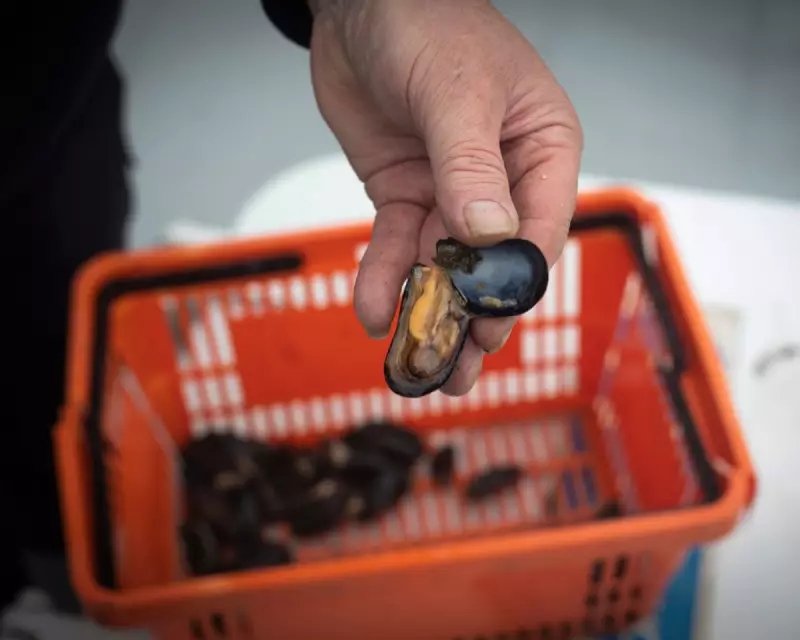
The Collapse of a Welsh Fishing Tradition
On a damp, windswept morning in north Wales, skipper Alan Owen navigates the 43-metre Valente out of Port Penrhyn near Bangor. The vessel heads toward the mussel grounds around the pier in the Menai Strait, the channel separating the Welsh mainland from Anglesey. Nets rise from the water, bulging with thousands of blue mussels freshly harvested from the seabed.
The Menai Strait's powerful tidal exchange, reaching up to six knots, creates ideal conditions for mussel cultivation, bringing abundant nutrients that make this "probably the best place in Britain for producing mussels," according to Owen.
From Boom to Near Bust
These natural advantages transformed the eastern Menai Strait into Britain's largest mussel farming area from the 1960s onward, employing generations of local families including Owen's father and uncle. For decades, the industry thrived, sending the vast majority of its produce to European markets where consumers in France, Belgium and the Netherlands have strong appetites for shellfish.
Before Brexit, the UK's specialised shellfish industry was valued at under £12 million annually - modest in economic terms but crucial for coastal communities. Britain's departure from the EU has virtually ended this trade in the Menai Strait, with production collapsing from approximately 10,000 tonnes per year to just five tonnes in 2022 - a staggering 99.95% reduction.
The Valente now stands as the last mussel dredging boat operating from Port Penrhyn, with the other three vessels either sold or redeployed. Myti Mussels, the company owning the Valente, remains the only one of four original mussel fishing companies still fully operational, now selling small quantities solely to UK customers.
Brexit Barriers and Water Quality Challenges
The administrative burden created by post-Brexit trading requirements proved devastating for north Welsh exporters. Sanitary and phytosanitary (SPS) controls at the border, along with health checks and additional paperwork, made EU exports practically impossible.
Complicating matters further, longstanding EU regulations restrict imports of live bivalve molluscs from non-member states. Mussels from "class B" waters like the Menai Strait can only enter the EU after purification - a costly process that stresses the molluscs, reducing their shelf life and appeal to European buyers.
The purification requires placing mussels in tanks of sterilised seawater for one to two days, but no plant in Bangor or elsewhere in the UK could handle the volumes previously exported. Some fishers also worry that sewage outflows after heavy rainfall haven't helped water quality improvements in recent times.
Glimmers of Hope and Generational Concerns
Potential relief may come from the "reset" deal announced in May between Keir Starmer's government and the EU, designed to eliminate the need for SPS controls at borders. Britain's shellfish exporters are expected to be among the main beneficiaries if implemented.
Adding to the optimism, an Irish seafood company has prepared a building next to Port Penrhyn for use as a purification plant, awaiting certification. "The customers are still there," says Owen. "Where we are situated, weather-wise, we are 100% reliable. If they pick up the phone and order, we deliver."
Despite this hope, the industry's fragility affects generational continuity. Owen's son Martin followed him into mussel harvesting, but the skipper has different ambitions for his 12-year-old grandson. "He has got the brains to go into something better," Owen remarks.
Rebuilding Challenges and Economic Potential
James Wilson, former owner of mussel producer Deepdock, expresses cautious optimism. His business ceased trading after Brexit, and he now runs a fish shop while teaching at Bangor University. "We tried every possible avenue to secure stable access to the EU market, but found a locked door at the end of it," he recalls.
Wilson worries that even with an SPS agreement - unlikely before 2027 - restarting significant exports will prove challenging. The mussel beds need repopulation with seed mussels that require years to reach marketable size. Combining uncertainty about juvenile mussel supply with export market instability creates too much risk for major investment.
David Jarrad, chief executive of the Shellfish Association of Great Britain, confirms many UK shellfish businesses remain "on hold." He emphasises the missed opportunity: "The UK is located in the sweet spot for cultivating shellfish almost anywhere in the world. Our aquaculture industry is minuscule in comparison with Spain and France and the Netherlands, even though we have a greater coastline."
A government spokesperson stated their focus on "negotiating an SPS deal that could add up to £5.1bn a year to our economy, by cutting costs and reducing red tape for British producers and retailers."
Back at his fish shop near Port Penrhyn, Wilson wonders if future trade improvements might inspire new generations. "Maybe if somebody with a bit more enthusiasm, a bit more energy, a bit of money comes in, then it might all happen." For now, the future of Menai Strait mussel fishing hangs in the balance, caught between Brexit realities and hopeful political negotiations.





